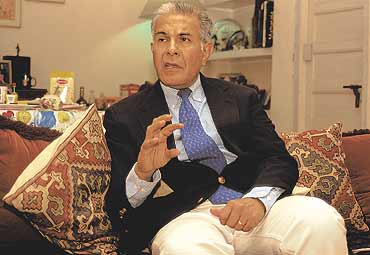
[stextbox id=”info”]Wajahat Habibullah is ready to take over as J&K first CIC, but his understanding of Kashmir coupled with his unhindered access to 10 Janpath makes him what some describe as the super governor. A KASHMIR LIFE report.[/stextbox]
Since July 1969 when he had his first appointment as sub-divisional magistrate (SDM) Sopore, Wajahat Habibullah has been a keen Kashmir watcher, almost an insider. During last four decades, even when he was posted outside the state, he somehow managed to remain linked to Kashmir. Finally at 64 he is ready to take over as J&K’s first Chief Information Commissioner (CIC).
Officially he will oversee the evolution of the Information Commission under the RTI Act. Given his understanding of Kashmir, his background of being an interlocutor, his record of taking positions on Kashmir by questioning a series of New Delhi’s decisions and his unhindered access to 10-Janpath makes him more important than others. On issues, chief minister Omar Abdullah’s ‘discovery’ could be more important than governor and the chief minister. So is Habibullah a super-governor as many of his friends and adversaries suggest?
Son of Major General E Habibullah, Wajahat started his career as a history lecturer in Saint Stephen’s College Delhi in July 1967 soon after completing his masters from the same institution. However, he could teach ancient history for less than a year as the Libran had to join the IAS in July 1968 and his first posting was in J&K. Until his deputation as joint secretary in PMO in June 1982, Wajahat had acquired a lot of experience and understanding in Kashmir especially how the system worked so differently here. Till 1990 when he was summoned back, he held vital positions in PMO with Indira Gandhi and later with Rajiv besides a three year term as administrator of Lakshadeep.
It was at the peak of turmoil in Feb 1990 when Wajahat was appointed initially as special commissioner for Islamabad and later as Divisional Commissioner, Kashmir. In Islamabad, when a delegation visiting him asked why the government was not halting the exodus of Kashmiri Pandits, Wajahat started thinking. Later he suggested governor Jagmohan to go on Doordarshan and appeal Kashmir Pandits to stay back but his request was not accepted.
As Divisional Commissioner he was responsible for suggesting and managing the ex-gratia relief for the family of slain civilians besides providing them a job under SRO 43. The first case he did was that of Ms Mehbooba, the survivor of BSF’s Mashali Mohalla massacre. “The prospect of restitution opened the door for people to approach the commissioner’s office for relief; the relief process became a tenuous thread that linked the government and the general public,” he recorded in his magnum opus ‘My Kashmir – Conflict and the prospects of Enduring peace’ many years later.
The most sensitive case that he handled as Division Commissioner was the Kunan mass rape. Though insisting that he was “unable to establish the veracity of the complaint” Habibullah says there was sufficient cause for a more detailed enquiry. Raj Bhawan “deleted my expression of misgivings” in the report (he submitted) and gave “army a clean chit”. It was after this incident that Habibullah survived an assassination bid in which a police officer and a woman were killed. He says he refused additional security suggested by Raj Bhawan and was transferred to Delhi.
It was his second stint as Divisional Commissioner Kashmir in July 1993 that was more eventful because of the Hazratbal siege. As the crisis was about to be resolved, he met an accident and was critically injured besides Lt Gen (retired) M A Zaki, the then adviser (security) to governor.
His insights into the siege are vital to the history of Kashmir even though he seems to have made a pick and choose of various associated incidents. As the reports of militants’ bid to steal the relic was reported to the government, Habibullah said in his book, he “opposed the move till such time as the report of lock tampering was actually authenticated, but I was the sole voice of dissent in the meeting.”

